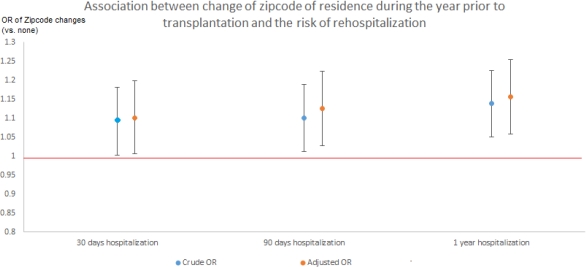Patient Change in Residence and Risk of Readmission after Renal Transplant in the US
Emory University, Atlanta, GA.
Meeting: 2018 American Transplant Congress
Abstract number: A317
Keywords: Kidney transplantation, Outcome, Post-operative complications
Session Information
Session Name: Poster Session A: Non-Organ Specific: Disparities to Outcome and Access to Healthcare
Session Type: Poster Session
Date: Saturday, June 2, 2018
Session Time: 5:30pm-7:30pm
 Presentation Time: 5:30pm-7:30pm
Presentation Time: 5:30pm-7:30pm
Location: Hall 4EF
To predict readmission post-kidney transplant (KTX-R), novel risk factors must be identified. We investigated the impact of a) neighborhood (zipcode) and its attributes and b) change of patients' residence prior to first KTX on the probability of 30 day, 90 day, and 1 year readmission (30DR, 90DR, and 365DR).
We examined first KTX recipients in the US (2005 to 2013) with Medicare as primary payer at time of transplant from USRDS (N=36,215); patients were linked with American Community Survey Census data to obtain neighborhood-level attributes. Using zipcode at time of transplant as a random effect, we assessed the degree to which neighborhood risk factors and patient characterisitcs explain disparities in KTX-R between zipcodes and investigate if the effect of patients' characteristics differs between zipcodes. We then assessed the impact of moving residence on KTX-R, defined as ≥1 change in zipcode in the year prior to KTX.
Patients' zipcode at time of transplant was significantly associated with KTX-R at any time even after adjusting for patients' case-mix. Although African Americans (AA) have a higher risk of KTX-R, patients living in a zipcode with a large proportion of AA had a lower risk of 90DR (p=0.02) and 365DR (p=0.002). Of note, the effect of patients' race was consistent across zipcodes. There was no association between KTX-R and zipcode poverty level, education level, and rurality.
Among our cohort, 3,131 patients moved at least once in the year prior to transplant and moving (vs. not moving) was associated with a 10-15% increased odds of 30DR, 90DR, and 365DR. Figure 1 shows the crude and adjusted odds ratio for all three selected timepoints in patients with ≥ 1 zipcode change. 
Studying patients' residence can provide relevant data to predict KTX-R. Moving residences in the year prior to transplant could reflect an unstable social situation that may impact post-transplant outcomes. Place of residence may be used as a proxy for both socioeconomic data not recorded in large registries and access to care, and could potentially assist transplant providers in early interventions to reduce poor post-transplant outcomes.
CITATION INFORMATION: Hogan J., Anderson M., Zhang Y., Kim J., Karadkhele G., Zhang X., Adams A., Patzer R. Patient Change in Residence and Risk of Readmission after Renal Transplant in the US Am J Transplant. 2017;17 (suppl 3).
To cite this abstract in AMA style:
Hogan J, Anderson M, Zhang Y, Kim J, Karadkhele G, Zhang X, Adams A, Patzer R. Patient Change in Residence and Risk of Readmission after Renal Transplant in the US [abstract]. https://atcmeetingabstracts.com/abstract/patient-change-in-residence-and-risk-of-readmission-after-renal-transplant-in-the-us/. Accessed February 18, 2026.« Back to 2018 American Transplant Congress
